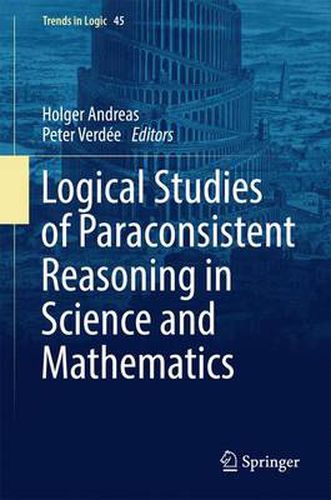Readings Newsletter
Become a Readings Member to make your shopping experience even easier.
Sign in or sign up for free!
You’re not far away from qualifying for FREE standard shipping within Australia
You’ve qualified for FREE standard shipping within Australia
The cart is loading…






This title is printed to order. This book may have been self-published. If so, we cannot guarantee the quality of the content. In the main most books will have gone through the editing process however some may not. We therefore suggest that you be aware of this before ordering this book. If in doubt check either the author or publisher’s details as we are unable to accept any returns unless they are faulty. Please contact us if you have any questions.
This book covers work written by leading scholars from different schools within the research area of paraconsistency. The authors critically investigate how contemporary paraconsistent logics can be used to better understand human reasoning in science and mathematics. Offering a variety of perspectives, they shed a new light on the question of whether paraconsistent logics can function as the underlying logics of inconsistent but useful scientific and mathematical theories. The great variety of paraconsistent logics gives rise to various, interrelated questions, such as what are the desiderata a paraconsistent logic should satisfy, is there prospect of a universal approach to paraconsistent reasoning with axiomatic theories, and to what extent is reasoning about sets structurally analogous to reasoning about truth. Furthermore, the authors consider paraconsistent logic’s status as either a normative or descriptive discipline (or one which falls in between) and which inconsistent but non-trivial axiomatic theories are well understood by which types of paraconsistent approaches. This volume addresses such questions from different perspectives in order to (i) obtain a representative overview of the state of the art in the philosophical debate on paraconsistency, (ii) come up with fresh ideas for the future of paraconsistency, and most importantly (iii) provide paraconsistent logic with a stronger philosophical foundation, taking into account the developments within the different schools of paraconsistency.
$9.00 standard shipping within Australia
FREE standard shipping within Australia for orders over $100.00
Express & International shipping calculated at checkout
This title is printed to order. This book may have been self-published. If so, we cannot guarantee the quality of the content. In the main most books will have gone through the editing process however some may not. We therefore suggest that you be aware of this before ordering this book. If in doubt check either the author or publisher’s details as we are unable to accept any returns unless they are faulty. Please contact us if you have any questions.
This book covers work written by leading scholars from different schools within the research area of paraconsistency. The authors critically investigate how contemporary paraconsistent logics can be used to better understand human reasoning in science and mathematics. Offering a variety of perspectives, they shed a new light on the question of whether paraconsistent logics can function as the underlying logics of inconsistent but useful scientific and mathematical theories. The great variety of paraconsistent logics gives rise to various, interrelated questions, such as what are the desiderata a paraconsistent logic should satisfy, is there prospect of a universal approach to paraconsistent reasoning with axiomatic theories, and to what extent is reasoning about sets structurally analogous to reasoning about truth. Furthermore, the authors consider paraconsistent logic’s status as either a normative or descriptive discipline (or one which falls in between) and which inconsistent but non-trivial axiomatic theories are well understood by which types of paraconsistent approaches. This volume addresses such questions from different perspectives in order to (i) obtain a representative overview of the state of the art in the philosophical debate on paraconsistency, (ii) come up with fresh ideas for the future of paraconsistency, and most importantly (iii) provide paraconsistent logic with a stronger philosophical foundation, taking into account the developments within the different schools of paraconsistency.